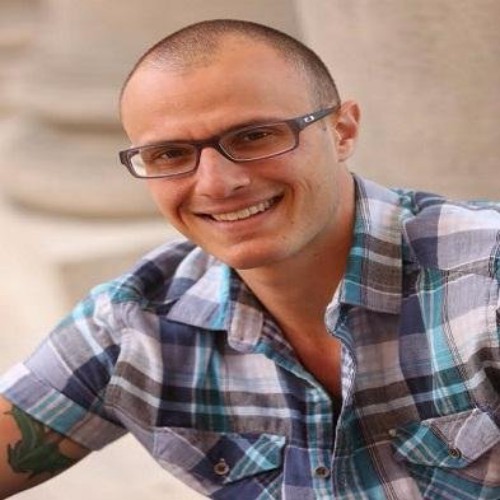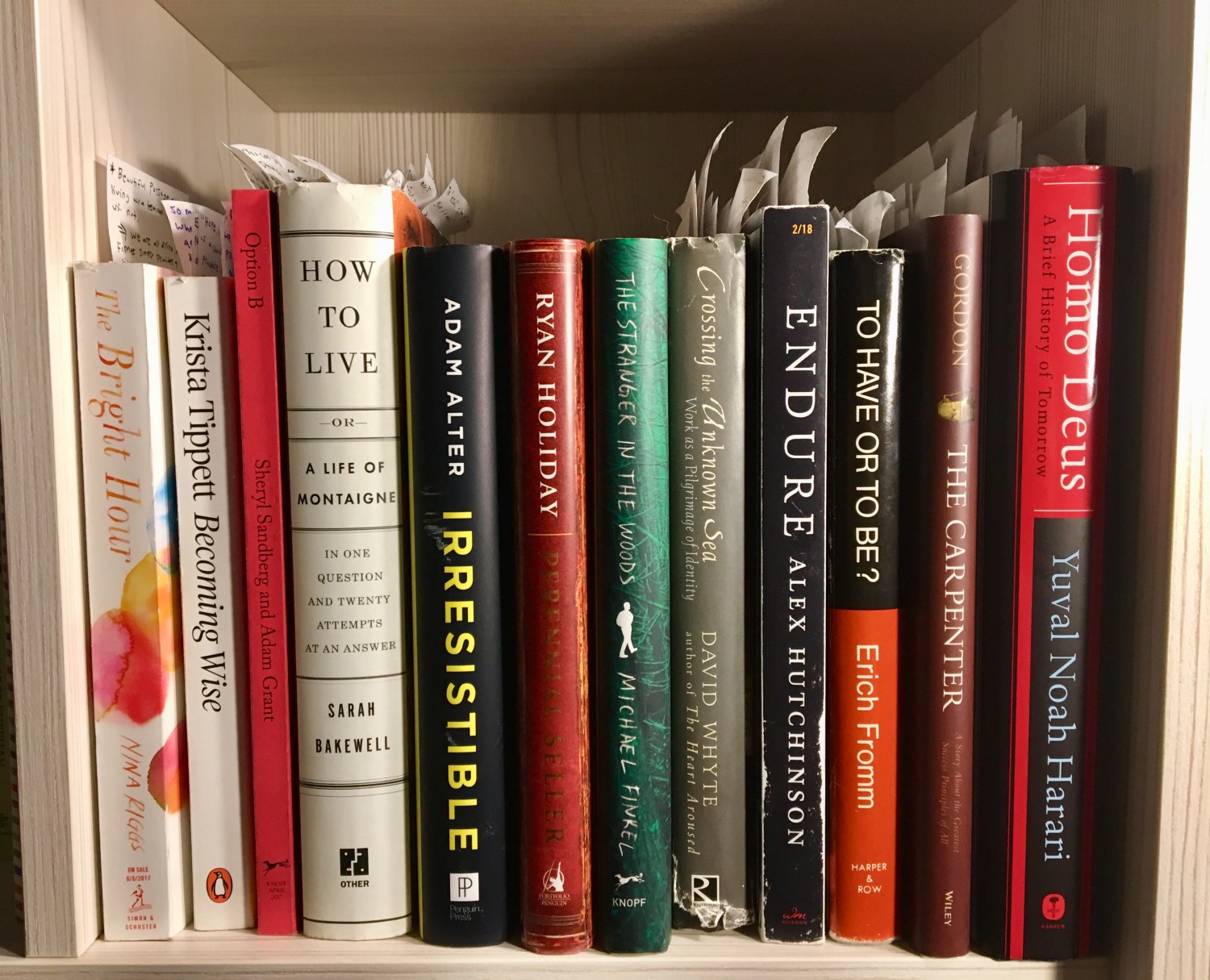An integral part of my writing process is exploring and connecting ideas from seemingly disparate domains. This requires reading broadly. I’ve read over 60 non-fiction books this year. (And, I published one!) I’m regularly asked about my favorites, the books that have most influenced my thinking. The following list, ordered alphabetically, represents just that. Note that not all of these books were first released in 2017 (some are decades old), but I first read them in 2017. I encourage to you to dive into these books yourself, and to consider giving those you love one of the best holiday gifts there is: the chance to explore new ideas and acquire knowledge.
Becoming Wise, Krista Tippett. A beautiful book that reminds us that listening is not the same thing as waiting to talk and that wisdom — which “leavens intelligence, enables consciousness, and advances evolution itself” — is gained through our lived experience with words, flesh, love, faith, and hope. This book made me realize that if we slow down and show-up to life fully present and without judgment, beauty and awe is all around us.
The Bright Hour, Nina Riggs. Courageous and heartfelt, about living and dying with cancer. Riggs does her best to help us — her readers — imagine the unimaginable. Though reading about death is never comfortable, I believe there is no better way to help you zero-in on what you want out of life. Riggs: “Living with a terminal disease is like walking on a tightrope over an insanely scary abyss. But living without a terminal disease is also like walking over an insanely scary abyss, only with some fog or cloud cover obscuring the depths a little more.” Riggs passed away before this book was published, but she’ll live on through her profound words.
The Carpenter, Jon Gordon. I had to debate whether or not to include this book on the list; not because it isn’t great, but because it falls somewhere in between fiction and non-fiction. Gordon chronicles a carpenter who is intent on doing good, quality work. In the process, he shows readers how to do the same. Though this is technically a fable, the principles that emerge from it are based upon solid evidence — and the story itself is rooted in truth. It’s a quick read — took me only two sittings — and yet it contains years’ worth of wisdom.
Crossing the Unknown Sea, David Whyte. We’re often told to separate “work” from “life” (the genesis of false paradigms like “work-life balance”). Whyte, however, argues that this is not possible, and even it were, it wouldn’t be a wise move. Whyte doesn’t view work as something distinct from life but rather he sees it for what it is: a central component of life. He explores what makes for good work (and thus for good life) and explains that whenever we are involved in “doing” work, we are equally involved in “becoming” who we are.
Endure, Alex Hutchinson.
Although not officially released until February of 2018, I couldn’t help but put Alex Hutchinson’s new book on the list. I was fortunate enough to read an advanced copy and it is a wonderful book. Hutchinson breaks down everything that we know about human fatigue. It is an immensely readable, and at the same time deeply scientific, dive into the limits of human performance and the fascinating new science of fatigue. This is a must read for anyone who wants to get more out of themselves.
Homo Deus, Yuval Noah Harari. Harari’s first book, Sapiens, was a detailed account of our species’ past. His latest looks into the future, and offers a few potential narratives of what lies ahead for us humans. Will we clash with technology, live in harmony with it, or become one with it? Harari has said that his books aren’t so much meant to be read literally but rather to make us think. This book does not disappoint.
How to Live: Or a Life of Montaigne in One Question and Twenty Attempts at An Answer. Sarah Bakewell. Part biography, part applied philosophy, this book explores the life of French Renaissance philosopher Michel de Montaigne, and his thoughts on how we all ought to live ours. Diverse topics are covered from dealing with death, to animal consciousness (including how we relate to our pets), to the best ways to approach learning, to politics and power. Bakewell is a masterful writer; so consider this a great look at Montaigne’s famous “essays” without having to sludge through his dense and at times disorganized prose. (Though, if you’re really interested, you should go to the primary source here).
Irresistible, Adam Alter. If you have a hard time putting down your phone or signing off from the internet, you’re not alone. Alter traces the rise of addictive technologies, discusses their downsides (hint: virtual reality and social networks take our attention away from lived-reality and real-life networks), and offers concrete practices that can help us have more harmonious relationships with our devices. A must read for anyone — which means just about everyone — who relies on 21st century tech. It’s not that these devices are inherently bad, but using them mindlessly is.
Option B. Sheryl Sandberg and Adam Grant. Contrary to what we might think, resilience isn’t only about pushing through, toughing it out, or finding meaning in loss. It’s also about cultivating joy. More than anything else, this book taught me that one need not give themselves permission to experience unadulterated joy. Rather, it is those very experiences that give us strength when we need it most. Part personal story (Sandberg’s tragic loss of her husband) and part science (Grant’s research), this book is sure to leave you thinking differently about resilience.
Stranger in the Woods, Michael Finkel. An utterly captivating story of Christopher Knight, otherwise known as the North Pond hermit. Knight disappeared into the woods of Maine in 1986 and stayed there for over 27 years, living off the land and provisions stolen from neighbors nearby. Upon his arrest (he did not come out of the woods voluntarily), he spoke with only one journalist: Finkel. And Finkel, at least for us readers, was a good choice. He put together a page-turner that is on its face about Knight’s stranger than fiction story but equally about human nature, solitude, what it means to be happy, and the many paradoxes in what we consider “normal” versus “abnormal” ways of living. I read this book in one sitting on a flight from San Francisco to Detroit. I literally couldn’t put it down.
To Have or To Be, Erich Fromm. Though I just discovered this book in 2017, it’s a classic study of what it means to be a fully-thriving human being. Interestingly, it’s not always just about pushing for more or needing to accomplish increasingly challenging objectives. It is also about being content with what you have while building on it thoughtfully; it’s about knowing who you are and what you love, and engaging in activities that allow you to express that. I especially love Fromm’s discussion of productive activity, or the “joy we experience in the process of growing nearer to the goal of becoming ourselves…the caring, responsibility, respect, and knowledge that are a syndrome of attitudes to be found in the person who develops his own powers productively, who only wants to have what he has worked for, who has given up narcissistic dreams of omniscience and omnipotence, who has acquired humility based on inner-strength only genuine productive activity can give.”
Last but not least, I’d be remiss not mention my own book, Peak Performance. If the criteria for inclusion in this list is books that have influenced my thinking in 2017, then Peak Performance deserves a spot. I learned tons throughout the research, reporting, and writing process of my first book, which came out in June. Perhaps more than anything, I learned that so many of the books in the self-help or emerging “performance” genre are full of shit. There are no silver bullets, magical “hacks,” or quick fixes. Rather, getting better at anything requires honing a few time-tested and science-backed practices while repeating the cycle stress + rest = growth. Peak Performance provides an evidence-based operating-system for getting the most out of yourself while avoiding burnout. If you haven’t yet checked it out, I’d encourage you to do so.
If you’re into books…Follow me on Twitter @Bstulberg, where I share what books I’m reading and pearls of wisdom from them. I love to interact on that platform.
Originally published at medium.com


